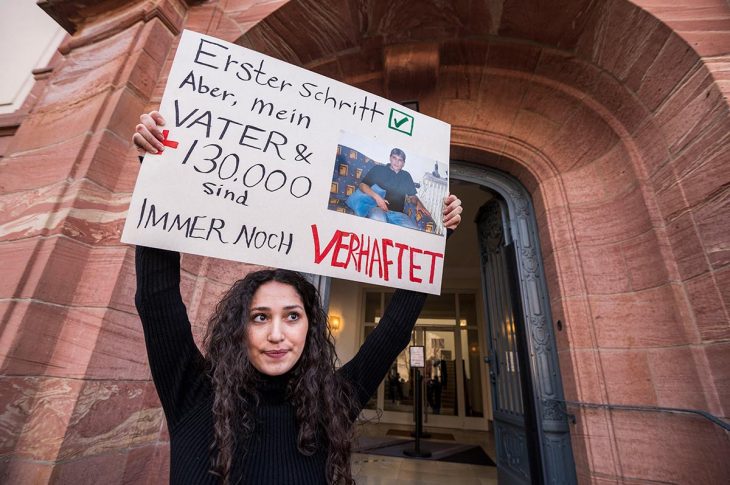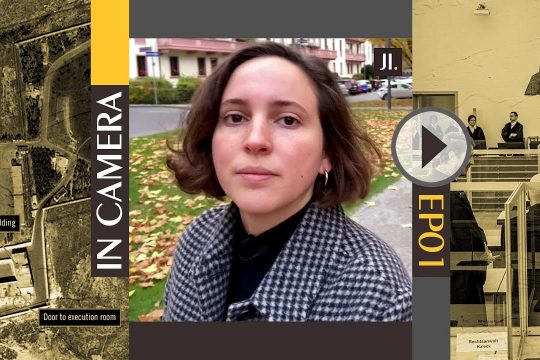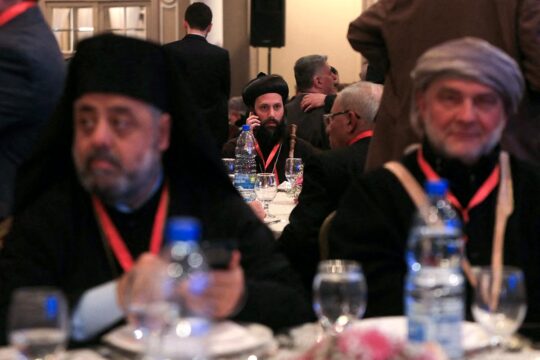The crimes were committed on a warm and sunny day in the fall of 2011. The Syrian revolution was just half a year old and the central government was already reacting violently. That day, a couple of thousand protesters had gathered in Douma, a district in Syria’s capital city Damascus, for a peaceful demonstration. Security forces, among them the 35-year-old sergeant major Eyad al-Gharib, had been sent to dissolve the protest. He said they were following the orders of Hafiz Makhlouf, a cousin of Syrian president Bashar al-Assad and the head of the general secret service’s subdivision 40, who was known for his cruelty and disregard of any rules or hierarchies. That day, Makhlouf arrived at the site of the protest and started firing his machine gun into the crowd. “If you love the president, shoot at the traitors!”, he commanded his troops. Eyad al-Gharib did not shoot, he later told the German police, and that was the day he decided to defect.
He did, however, search the streets for fleeing protesters, arrest them and transport at least thirty of them to secret service branch 251 in Damascus, also known as Al-Khatib branch, where he knew that torture awaited them. On February 24, almost ten years later, a German court has convicted him to four and a half years in prison for aiding and abetting crimes against humanity in the form of torture and severe deprivation of liberty.
Defining Assad’s attack as a crime against humanity
Since April 2020, Eyad al-Gharib had been on trial in the West German city of Koblenz. His co-defendant Anwar Raslan was the branch 251’s alleged head of investigations, which according to the indictment would make him responsible for 4,000 cases of torture, 58 killings and two cases of sexual violence. Both defendants had defected in 2012, fled the country and arrived in Germany as refugees, where they were later charged with crimes against humanity under the principle of universal jurisdiction. They had triggered the investigations against them by talking too openly about their past to the German authorities. Last month, the judges in Koblenz severed the two proceedings, as all the evidence against Eyad al-Gharib had been heard. The trial against Anwar Raslan will continue separately.
Eyad al-Gharib was considered the less important defendant in the so-called Al-Khatib trial, but his conviction will go down in history. He is the first Syrian officer to be held accountable for the Assad regime’s atrocities against the Syrian population, as opposed to strictly individual crimes as in the case of another government soldier tried in Sweden. His own role in them was limited, but activists and observers celebrated the judgement for a different reason: It was the first time that a criminal court has defined what has been happening in Syria since 2011 as crimes against humanity. They hope that on a long road to justice for Syria, this verdict may become a foundation to build on.
Illustrating but not representing the regime
In her verdict, Judge Anne Kerber spoke about al-Gharib’s specific crimes only briefly. The larger part of her decision described the context in which they were committed. She went back as far as 1970, when Hafiz al-Assad, Bashar’s father, took over power, and explained how the Assad clan had started using the secret services as an instrument of power. “Bashar al-Assad took over these structures and used the secret services especially from 2011 to intimidate and annihilate the opposition”, Kerber read out, establishing that what happened then was in fact a widespread and systematic attack against a civilian population, the defining element of crimes against humanity.
The arbitrary arrests, the military sieges of opposition areas, the massacres, mass torture and murder of political prisoners – all these had been organised at the highest government levels, she stated, referring to documents provided by the Commission for International Justice and Accountability (CIJA), an NGO specialized in war crimes investigations, that proved that orders had come from the very top. Kerber also referred to the Caesar photos as evidence of the inhumane treatment inside the secret service prisons, adding that she, personally, would never forget the images of emaciated and abused corpses that had been analysed by a forensic expert in the Koblenz courtroom.
Even though the verdict focused mainly on the Assad regime’s atrocities – as had the prosecutor’s plea and the 60 days of hearings – Kerber made sure to mention that the defendant was not being convicted as a representant of that regime, “but for the specific and limited contribution he made to its cruelty.” Eyad al-Gharib had heard the prisoners’ screams and seen the dead bodies being transported out of Al-Khatib branch. He knew that each of the thirty protesters he brought there from Douma would meet the same fate, the court said. “All of them received the so-called welcome party”, explained Kerber, referring to a routine beating that all new arrivals were subjected to. “And they all suffered indescribable prison conditions. All of them had to hear the screams of those being tortured and all lived in absolute insecurity about whether or not they would get out alive.”
Crimes not committed under duress
Kerber rejected the defence lawyers’ request for acquittal on the argument that al-Gharib had had no choice but to follow orders, as any direct disobedience would have put his own life at risk. “He could have just left the scene”, Kerber said, questioning whether anyone would have noticed with all the commotion and large number of security forces. “He could have faked an injury or just stumbled”, she added. “He could have pretended to be sick that day.” In his favour, however, she mentioned that he had defected quite early and had been willing to provide the German authorities with evidence on crimes in Syria – so much so that his own indictment and conviction would not have been possible without the statement he himself gave to the German police concerning his work for the Syrian secret service. His somewhat accidental confessions were the only evidence on his individual crimes that has been presented in court.
Eyad al-Gharib, who a week earlier had fallen asleep during the prosecutor’s plea and cried during the defence’s, listened to the verdict with a resigned look on his face, his head resting on his arms. A few times, he scanned the public gallery filled with journalists, Syrian activists and observers as if to gauge what they all made of him. He waved a quick greeting towards his teenage son and his cousin who were seated among the crowd. “Those who defected in 2012 were celebrated as heroes by the opposition”, said his cousin after the sentencing. He added that Eyad al-Gharib, like every Syrian, had his share of family members disappeared, tortured and killed by the Assad regime. In his view, he was not part of the perpetrators’ side. “He is innocent, and we will do everything to prove that,” the cousin said. Immediately after the verdict, the defence announced that they would appeal.
A foundation for further trials
Among the Syrian opposition, opinions appeared mixed. Some believe that al-Gharib had knowingly contributed to crimes against humanity, that he had chosen sides when he joined the secret service in 1996. Others see him as a tragic figure who is being punished while high-ranking regime members are still at large and even in power. But for most of the exiled activists, journalists and oppositionals who gathered outside the courtroom after the verdict, the individual case of Eyad al-Gharib was not at the centre of attention. What they cared about deeply was the fact that for the very first time after 50 years of Assad dictatorship and impunity, someone had finally been held accountable for the mass murder, the torture, the “systematic annihilation of the opposition”, as the judges had called it.
Apart from the emotional reckoning this offers to survivors and families of victims, the verdict of crimes against humanity may have important implications. “On a political level, it will make it harder for countries to normalize diplomatic relations with the Assad regime”, hoped Ameenah Sawwan from The Syria Campaign, an NGO. “And on a legal level, the verdict can be used as a foundation for further trials and set a good example for other European Union countries that have started to investigate Syrian regime members.” Finally, she added, the judgement was of historical relevance, as it guaranteed that a counternarrative to the Assad regime’s propaganda had been preserved for future generations.








